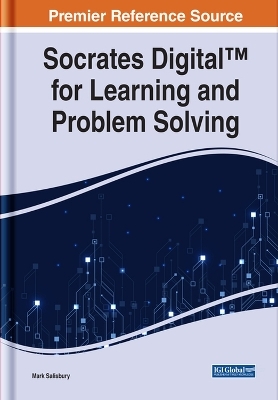
Socrates Digital™ for Learning and Problem Solving
Seiten
2021
Business Science Reference (Verlag)
978-1-7998-7955-8 (ISBN)
Business Science Reference (Verlag)
978-1-7998-7955-8 (ISBN)
Presents the rationale for developing a Socratic problem-solving application. The book describes how a computer-based Socratic problem-solving system called Socrates Digital can keep problem-solvers on track, document the outcome of a problem-solving session, and share those results with problem-solvers and larger audiences.
There is a tremendous need for computer scientists, data scientists, and software developers to learn how to develop Socratic problem-solving applications. While the amount of data and information processing has been accelerating, our ability to learn and problem-solve with that data has fallen behind. Meanwhile, problems have become too complex to solve in the workplace without a concerted effort to follow a problem-solving process. This problem-solving process must be able to deal with big and disparate data. Furthermore, it must solve problems that do not have a "rule" to apply in solving them. Moreover, it must deal with ambiguity and help humans use informed judgment to build on previous steps and create new understanding. Computer-based Socratic problem-solving systems answer this need for a problem-solving process using big and disparate data. Furthermore, computer scientists, data scientists, and software developers need the knowledge to develop these systems.
Socrates Digital™ for Learning and Problem Solving presents the rationale for developing a Socratic problem-solving application. It describes how a computer-based Socratic problem-solving system called Socrates DigitalTM can keep problem-solvers on track, document the outcome of a problem-solving session, and share those results with problem-solvers and larger audiences. In addition, Socrates DigitalTM assists problem-solvers to combine evidence about their quality of reasoning for individual problem-solving steps and their overall confidence in the solution. Socrates DigitalTM also captures, manages, and distributes this knowledge across organizations to improve problem-solving. This book also presents how to build a Socrates DigitalTM system by detailing the four phases of design and development: Understand, Explore, Materialize, and Realize. The details include flow charts and pseudo-code for readers to implement Socrates DigitalTM in a general-purpose programming language. The completion of the design and development process results in a Socrates DigitalTM system that leverages artificial intelligence services from providers that include Apple, Microsoft, Google, IBM, and Amazon. In addition, an appendix provides a demonstration of a no-code implementation of Socrates DigitalTM in Microsoft Power Virtual Agent.
There is a tremendous need for computer scientists, data scientists, and software developers to learn how to develop Socratic problem-solving applications. While the amount of data and information processing has been accelerating, our ability to learn and problem-solve with that data has fallen behind. Meanwhile, problems have become too complex to solve in the workplace without a concerted effort to follow a problem-solving process. This problem-solving process must be able to deal with big and disparate data. Furthermore, it must solve problems that do not have a "rule" to apply in solving them. Moreover, it must deal with ambiguity and help humans use informed judgment to build on previous steps and create new understanding. Computer-based Socratic problem-solving systems answer this need for a problem-solving process using big and disparate data. Furthermore, computer scientists, data scientists, and software developers need the knowledge to develop these systems.
Socrates Digital™ for Learning and Problem Solving presents the rationale for developing a Socratic problem-solving application. It describes how a computer-based Socratic problem-solving system called Socrates DigitalTM can keep problem-solvers on track, document the outcome of a problem-solving session, and share those results with problem-solvers and larger audiences. In addition, Socrates DigitalTM assists problem-solvers to combine evidence about their quality of reasoning for individual problem-solving steps and their overall confidence in the solution. Socrates DigitalTM also captures, manages, and distributes this knowledge across organizations to improve problem-solving. This book also presents how to build a Socrates DigitalTM system by detailing the four phases of design and development: Understand, Explore, Materialize, and Realize. The details include flow charts and pseudo-code for readers to implement Socrates DigitalTM in a general-purpose programming language. The completion of the design and development process results in a Socrates DigitalTM system that leverages artificial intelligence services from providers that include Apple, Microsoft, Google, IBM, and Amazon. In addition, an appendix provides a demonstration of a no-code implementation of Socrates DigitalTM in Microsoft Power Virtual Agent.
| Erscheinungsdatum | 16.09.2021 |
|---|---|
| Sprache | englisch |
| Maße | 216 x 279 mm |
| Gewicht | 633 g |
| Themenwelt | Informatik ► Software Entwicklung ► User Interfaces (HCI) |
| Informatik ► Theorie / Studium ► Künstliche Intelligenz / Robotik | |
| ISBN-10 | 1-7998-7955-0 / 1799879550 |
| ISBN-13 | 978-1-7998-7955-8 / 9781799879558 |
| Zustand | Neuware |
| Haben Sie eine Frage zum Produkt? |
Mehr entdecken
aus dem Bereich
aus dem Bereich
Aus- und Weiterbildung nach iSAQB-Standard zum Certified Professional …
Buch | Hardcover (2023)
dpunkt Verlag
CHF 48,85
Lean UX und Design Thinking: Teambasierte Entwicklung …
Buch | Hardcover (2022)
dpunkt (Verlag)
CHF 48,85
Wissensverarbeitung - Neuronale Netze
Buch | Hardcover (2023)
Carl Hanser (Verlag)
CHF 48,95


